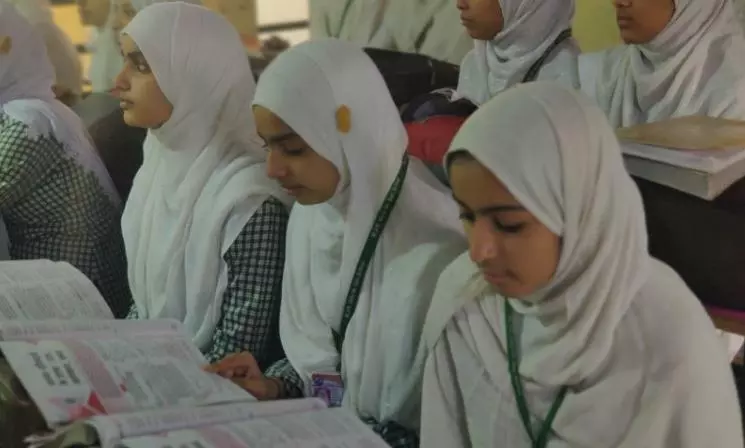
UP Madrasa Act strike down affects 26 lakh students, 10,000 teachers
text_fieldsThe Allahabad High Court's decision to strike down the UP Madrasa Act 2004 has impacted the livelihoods of over 10,000 madrasa teachers and the education of 26 lakh students, despite the court's order to the state government to accommodate the affected students by creating new educational setups, according to a report published in The Wire.
Justices Vivek Chaudhary and Subhash Vidyarthi agreed with a non-Muslim petitioner’s argument that the Madrasa Act is a violation of the Constitution’s secular values, apart from his concerns over not providing quality education to the madrasa students.
The petitioner, lawyer Anshuman Singh Rathore, also contended that the Madrasa Act fails to provide quality compulsory education up to the age of 14 years or class 8, as mandated by Article 21-A of the Constitution. Rathore further argued that the Act does not ensure universal and quality school education for all children studying in madrasas.
The court's decision also mandated the Uttar Pradesh government, led by Chief Minister Adityanath, to accommodate madrasa students into regular state-run schools at various levels, including primary, secondary, and intermediate.
With over 16,000 recognized madrasas in Uttar Pradesh, and thousands more unregistered, the judgment has stirred concerns about the fate of these institutions and the quality of education they offer. The High Court's scrutiny revealed that the education provided by madrasas did not meet the standards mandated by the Constitution, particularly in terms of offering modern and universal education up to the age of 14.
The court concurred, emphasizing that the Act violated key constitutional provisions and failed to provide education on par with other recognized educational institutions.
While some defend madrasas, arguing they provide modern education alongside religious instruction, the court's judgment highlights disparities in the curriculum, where religious studies take precedence over other subjects.
The ruling has prompted concerns about the livelihoods of madrasa teachers, who fear unemployment if the institutions are forced to close. Faiyaz Ahmed Misbahi, a madrasa teacher in Balrampur, expressed apprehension about the court's silence on the fate of educators, emphasizing the need for clarity and support for affected teaching staff.
Madrasa associations have vowed to challenge the High Court's decision in the Supreme Court, reflecting broader uncertainties surrounding the future of religious education in the state. However, the court's verdict underscores the importance of secularism in educational policy and the state's obligation to provide quality education to all children, regardless of religious affiliation.
While the Adityanath government defended the Madrasa Act, the Union government took a different stance, asserting that religious instruction should not be integrated into school education. This divergence highlights broader debates about the role of religion in education and the state's responsibility to uphold secular principles.
As stakeholders await further developments, questions loom over the fate of madrasa students, teachers, and the broader educational landscape in Uttar Pradesh. The ruling has ignited discussions about the need for educational reform and the balance between religious instruction and secular education in India's diverse society.
The implications of the Allahabad High Court's decision extend beyond Uttar Pradesh, sparking debates about the place of religious education in modern India and the state's role in shaping inclusive and equitable educational policies























